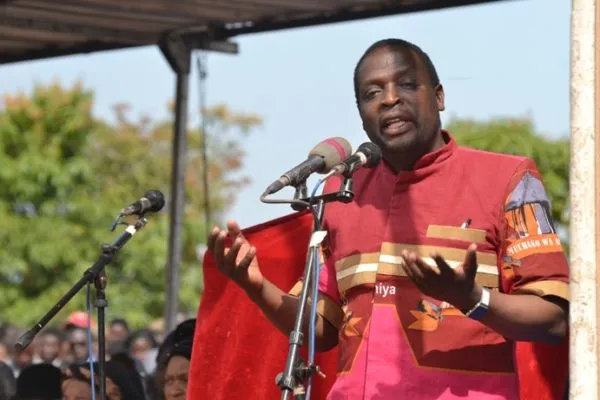BY PIJ REPORTER
Blue-eyed businessman for the Democratic Progressive Party (DPP)-led administration Leston Mulli obtained fuel worth K500 million on credit from the state-owned National Oil Company of Malawi (NOCMA) through a bank guarantee endorsement, but after he failed to remit the funds, he obtained a court injunction stopping NOCMA from seeking repayment through the bank.
PIJ has confirmed the account of events through multiple sources, including insiders at NOCMA and officially the office of the Attorney General and NOCMA Management. According to sources, a figure also officially confirmed by NOCMA, Mulli currently owes NOCMA K326 million after paying part of the amount back.
Mulli did not pick up calls from PIJ or respond to written questions as PIJ sought his comment.
Despite the matter being in court, the PIJ was unable to source court documents at the Commercial Division in Lilongwe as it went to press. Neither Mulli nor his legal representatives did not respond to our requests for comment on the matter.
The development comes as Malawians have been struggling with exorbitant oil prices and the state-owned country struggling to supply the commodity to Malawians, leading to recent chaos at filling stations across the country.
Following the failure to repay the loan, Mulli sued NOCMA management in court for seeking to force him to make the repayment, Attorney General Thabo Nyirenda confirmed in an interview.
‘I am aware of the issue. It was brought to my attention by the former CEO of NOCMA (Hellen Buluma). The matter is currently in court. It’s one of the many sad transactions which would bring down state-owned enterprises. We saw the same characters bringing down Malawi Savings Bank. The same characters have turned to NOCMA. The transaction is a reminder that thorough business due diligence must be carried out when dealing with politically exposed persons. It is these politically exposed persons that have caused the collapse of a great number of state-owned enterprises,” said Nyirenda.
He said the matter went to the Commercial Division of the High Court in Lilongwe, but referred PIJ to NOCMA for further questions.
According to a well-placed source, Mulli was on a credit limit supported by a bank guarantee and repaid some money and stopped paying with an outstanding amount of K326 million yet to be paid.
NOCMA Acting Chief Executive Officer Macklas Reuben also confirmed in an interview the developments, saying Mulli was initially repaying the credit timely before stopping payments in 2021.
He said NOCMA wrote the bank which had provided the guarantee for the credit facility to pay for Ecosave’s non-payment, but Ecosave rushed to court.
“He (Mulli) went to court again to seek contempt of court charges against me and Helen for not allowing him to buy fuel from NOCMA. Helen and Mr Mulli talked and agreed to set up a meeting on 25th Nov 2022 to discuss the way forward. So we are still meeting despite what has happened. We will advise you appropriately once this meeting is held,” said Reuben.
Reuben said NOCMA set up a payment plan which was that they should stop buying on credit and for every cash purchase the company makes, NOCMA will be deducting 30% from each purchase to cover the credit amount.
“We suddenly got an injunction stopping proceeding with that particular action. We later discussed a payment plan and the plan was eventually blocked by the fuel shortages which hit the country recently,” said Reuben.
He was not showing any progress on payment. We wanted to cash on the bank guarantee, but he decided to get an injunction against Nocma. We had a meeting with them where we wanted to agree on a payment plan by allowing him to buy products in cash and deducting 30% of any cash payment made.
However, when we contacted one of Mulli’s lawyers, Tamando Chokotho, for his position, he said he could not comment as he was not aware of the matter. Chokotho previously represented Mulli in other high-profile commercial cases.
“I have never handled such a matter, please check with the court for who is handling the case,” said Chokotho.
The development comes as Mulli and the government are embroiled in several legal tussles over various contracts. Among them, Mulli-connected companies are accused of abusing letters of credit from the Reserve Bank for the supply of fertilizer, with the companies failing to pay back funds to the central bank after supplying the government.
The Reserve Bank sued the companies after an audit reported that the companies, FF trading, Mulli Brothers Limited, Web commercials limited and Rock-bar-rock, obtained Letters of Credit from the bank to supply fertilizer to Smallholder Farmers Fertilizer revolving
Fund of Malawi (SSFRFM) in the 2018/2019 and 2019/2020 FISP seasons.
However, the companies, alongside two other, private entities defaulted their payments forcing RBM to settle the balance amounting to over 3.1 billion kwacha.
Additionally, the Attorney General also argues that Mulli, in contravention of procurement laws, registered companies under different addresses but both belonging to his company.
Mulli is among the debtors of the formerly state-owned Malawi Savings Bank (MSB) which was controversially sold to businessman Thom Mpinganjira’s FDH banking with the government offsetting all so-called toxic loans. A government-set loan recovery firm has never succeeded to recover the funds.
A deal to restructure the repayment for a period of 70 years signed by former Chief Secretary to the Government Lloyd Muhara is now subject to criminal prosecution.
Mulli also controversially sued and was awarded 3.4 billion kwacha public funds out of court by former Attorney General Charles Mhango for alleged damages his company Sunrise Pharmaceutical suffered during the 2020 anti-government demonstrations despite decades of precedent in which successive governments have refused to pay for legal claims emanating from damages from protests.
Mhango’s predecessors as Attorney General, Anthony Kamanga and Kalekeni Kaphale also refused to approve the compensation.
Mulli is also being accused by the government of failing to deliver mosquito-treated nets which were procured by the Ministry of Health, but the company recently sued the government for barring it from participating in this year’s Affordable Inputs Programme (AIP) as one of the suppliers.
The government attributed its stance to the company “owing the government billions of Kwacha,” from various contracts.
The Platform for Investigative Journalism is an independent non-profit centre for investigative journalism.




.jpg)
